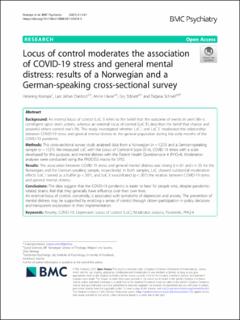| dc.contributor.author | Krampe, Henning | |
| dc.contributor.author | Danbolt, Lars Johan | |
| dc.contributor.author | Haver, Annie | |
| dc.contributor.author | Stålsett, Gry | |
| dc.contributor.author | Schnell, Tatjana | |
| dc.date.accessioned | 2021-10-11T09:21:18Z | |
| dc.date.available | 2021-10-11T09:21:18Z | |
| dc.date.created | 2021-08-09T11:00:15Z | |
| dc.date.issued | 2021-09 | |
| dc.identifier.citation | Krampe, H., Danbolt, L.J., Haver, A. et al. (2021) Locus of control moderates the association of COVID-19 stress and general mental distress: results of a Norwegian and a German-speaking cross-sectional survey. BMC Psychiatry, 21, 437 (2021) | en_US |
| dc.identifier.issn | 1471-244X | |
| dc.identifier.uri | https://hdl.handle.net/11250/2788960 | |
| dc.description.abstract | Background
An internal locus of control (LoC I) refers to the belief that the outcome of events in one’s life is contingent upon one’s actions, whereas an external locus of control (LoC E) describes the belief that chance and powerful others control one’s life. This study investigated whether LoC I and LoC E moderated the relationship between COVID-19 stress and general mental distress in the general population during the early months of the COVID-19 pandemic.
Methods
This cross-sectional survey study analysed data from a Norwegian (n = 1225) and a German-speaking sample (n = 1527). We measured LoC with the Locus of Control-4 Scale (IE-4), COVID-19 stress with a scale developed for this purpose, and mental distress with the Patient Health Questionnaire 4 (PHQ-4). Moderation analyses were conducted using the PROCESS macro for SPSS.
Results
The association between COVID-19 stress and general mental distress was strong (r = .61 and r = .55 for the Norwegian and the German-speaking sample, respectively). In both samples, LoC showed substantial moderation effects. LoC I served as a buffer (p < .001), and LoC E exacerbated (p < .001) the relation between COVID-19 stress and general mental distress.
Conclusions
The data suggest that the COVID-19 pandemic is easier to bear for people who, despite pandemic-related strains, feel that they generally have influence over their own lives.
An external locus of control, conversely, is associated with symptoms of depression and anxiety. The prevention of mental distress may be supported by enabling a sense of control through citizen participation in policy decisions and transparent explanation in their implementation. | en_US |
| dc.language.iso | eng | en_US |
| dc.publisher | BioMed Central | en_US |
| dc.rights | Navngivelse 4.0 Internasjonal | * |
| dc.rights.uri | http://creativecommons.org/licenses/by/4.0/deed.no | * |
| dc.subject | COVID-19 | en_US |
| dc.subject | stress | en_US |
| dc.subject | mental helse | en_US |
| dc.subject | psykisk helse | en_US |
| dc.subject | pandemi | en_US |
| dc.title | Locus of control moderates the association of COVID-19 stress and general mental distress: results of a Norwegian and a German-speaking cross-sectional survey | en_US |
| dc.type | Peer reviewed | en_US |
| dc.type | Journal article | en_US |
| dc.description.version | publishedVersion | en_US |
| dc.rights.holder | © The Author(s) | en_US |
| dc.subject.nsi | VDP::Medisinske Fag: 700::Klinisk medisinske fag: 750::Psykiatri, barnepsykiatri: 757 | en_US |
| dc.source.pagenumber | 13 | en_US |
| dc.source.volume | 21 | en_US |
| dc.source.journal | BMC Psychiatry | en_US |
| dc.identifier.doi | 10.1186/s12888-021-03418-5 | |
| dc.identifier.cristin | 1924656 | |
| dc.source.articlenumber | 437 (2021) | en_US |
| cristin.ispublished | true | |
| cristin.fulltext | original | |
| cristin.qualitycode | 2 | |

